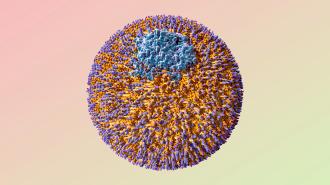A biotech startup has successfully lowered the cholesterol levels of monkeys using a version of CRISPR that doesn’t permanently alter DNA — suggesting a safer way to take advantage of the groundbreaking technology.
The challenge: Most genes are instruction manuals for making proteins. Those proteins dictate what your cells look like and do, trigger or stop chemical reactions, and influence almost everything else about your body.
Using CRISPR, researchers can edit genes to change these proteins — a CRISPR treatment for sickle cell anemia, for example, corrects a genetic mutation that causes red blood cells to produce irregularly shaped hemoglobin proteins.
CRISPR sometimes edits genes in places it’s not supposed to, though, and those off-target edits can create new problems. Because CRISPR alters DNA itself, the mistakes are usually irreversible, too.
Tune targets epigenetic marks to control gene expression, rather than editing genes themselves.
Epigenetic editing: Nearly every cell in your body contains all of your genes, but because you don’t need every cell to make every possible protein all the time, your body uses chemical compounds called “epigenetic marks” to dictate which genes in a cell are on (or “expressed”) and which aren’t. That’s what makes a heart cell different from a brain cell.
Tune Therapeutics is developing a CRISPR-based platform, called TEMPO, that targets these epigenetic marks to control gene expression, rather than editing the genes themselves. The idea is that this will allow them to influence the proteins that play a pivotal role in our health, without the risk of permanent off-target effects.
What’s new? Tune’s first major test for TEMPO is the PCSK9 gene. Reducing the expression of this gene or blocking its effect lowers LDL (“bad”) cholesterol in people, but the only FDA-approved PCSK9 inhibitor drugs are injections that must be administered regularly, are expensive, and can have side effects.
Biotech startup Verve Therapeutics is using a CRISPR-based therapy, called “base editing,” to permanently turn off the PCSK9 gene by swapping out a single letter of DNA. In monkeys, it slashed LDL-C levels by 70% in two weeks, and the effect appeared to last indefinitely — suggesting it could be a lifetime cure for high cholesterol.
Verve is now running a human clinical trial in New Zealand and the UK, but it has had trouble getting FDA approval to start it in the US, in part because of concerns about potential off-target edits.
“It does really look like they were able to silence that gene in a very long-term way.”
David Segal
Tune is hoping to achieve a similar effect on LDL without permanently altering DNA.
After successful tests in rodents, Tune researchers administered a single dose of their TEMPO treatment to three monkeys intravenously. After 120 days, the levels of LDL-C in the monkeys’ blood had fallen by 56%.
According to Tune, this is the first example of anyone successfully editing the epigenome of a non-human primate.
“This Tune data looks beautiful,” David Segal, a gene-editing researcher at UC Davis, who was not involved in the study, told STAT News. “It does really look like they were able to silence that gene in a very long-term way and they were able to see clinical benefits from that.”
The treatment could be a one-and-done alternative to costly PCSK9 inhibitors.
Looking ahead: Tune’s monkey study is ongoing, and while it’s possible the changes in the animals’ protein levels could be permanent, they also might not be.
“There might be transcription factors or other forces that will try to counteract the kinds of changes we make,” Segal said of epigenetic editing.
If the effect does seem to be long-lasting, the treatment could be a one-and-done alternative to costly PCSK9 inhibitors and might have an easier time getting approval than permanent gene editing. That’s if Tune decides to pursue clinical trials — it’s possible the company might first use the technique to target a disease for which there isn’t already a treatment available first.
“This data is highly encouraging for the field, as it presents a broad proof-of-concept for liver-directed epi-editing and attests to the potential for genetic tuning to unlock common disease and regenerative medicine,” said CEO Matt Kane.
We’d love to hear from you! If you have a comment about this article or if you have a tip for a future Freethink story, please email us at tips@freethink.com.
